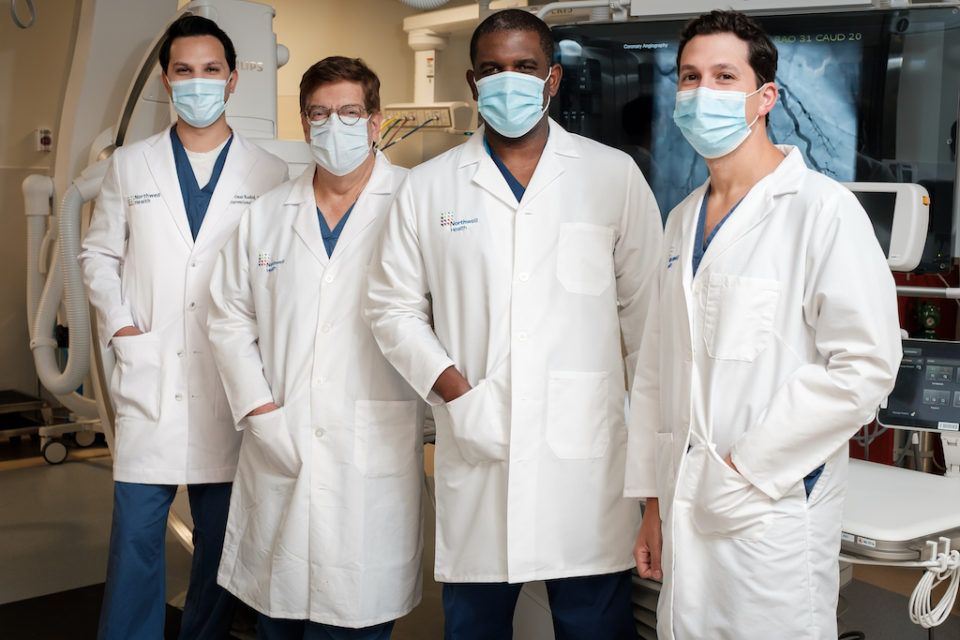NWH Opens Seema Boesky Heart Center and new Cardiac Catherization Lab

NWH Opens Seema Boesky Heart Center and new Cardiac Catherization Lab: Northern Westchester Hospital will open its new state of the art Cardiac Catherization Lab on September 2 as part of their new Seema Boesky Heart Center. Their new Cath Lab, a specialized hospital unit where coronary artery disease is diagnosed and treated, will occupy a 1,709-square-foot space, on the second floor of their main building, and will be open 24 hours, seven days a week. NWH’s Cardiac Catherization Lab will put critical diagnostic and interventional cardiac care minutes away for local residents who previously would be sent to Danbury, Stamford or Westchester Medical Center in Valhalla by 911 in the event of a cardiac arrest.
NWH’s Cath Lab will be staffed by four Interventional Cardiologists, led by Dr. Carl D. Reimers, Director of the Cardiac Catheterization Lab at Northern Westchester Hospital. They will be equipped to perform angiograms and angioplasty procedures to diagnose and remove blockages in arteries through the state of the art use of small tubes, called catheters. According to Dr. Carl D. Reimers, “in the event of a heart attack, opening up an artery to restore blood flow within 90 minutes of first medical contact is the “magic” time resulting in the best outcomes.” Now, these life-saving surgical procedures will be available just minutes away for patients in Armonk, Bedford, Chappaqua and beyond.
What must happen in the “magic” 90 minutes?
According to Dr. Reimers, a person experiencing a massive heart attack or congestive heart failure must be stabilized and diagnosed at the same time. “That’s why I consider a cath lab really two facilities in one.” An advanced x-ray suite in which the surgeon can perform an angiogram of your heart and its arteries. And “an intensive care unit that provides multiple critical supports to patients during the diagnostic procedure. These can consist of medications to thin the blood and to sustain blood pressure, as well as the insertion of mechanical devices close to or in the heart to help it pump blood. Then, of course, there is the catheterization procedure itself to eliminate the blockage.”
Dr. Reimers describes the angiogram as, “a movie of the heart and its arteries. Viewing this on a TV screen, I can assess the arterial blood flow, and the location, size and shape of any blockages.” During the angioplasty, the surgeon uses a catheter with a tiny balloon that inflates inside the blocked area, pushing the artery open. “Next, a tiny stainless steel coil called a stent is placed there as scaffolding to keep the artery open. The balloon is removed; the stent remains in place.”
Lenox Hill Hospital comes to Mt. Kisco
NWH’s new lab is an extension of Lenox Hill Hospital which along with Northern Westchester Hospital is part of Northwell Health. Lenox Hill Hospital is home to the first angioplasty ever performed in the United States. The Lenox Hill program has been ranked in the top five percent of hospitals in the nation for overall cardiac services for six years in a row.
All four Interventional Cardiologists on rotation at NWH, are affiliated with the Lenox Hill program. This means NWH’s new Cath Lab will provide care equivalent to that of New York City’s most distinguished program. In addition to Dr. Reimers, the NWH staff of surgeons includes Dr. A. Garvey Rene, who has performed more than 3,000 diagnostic cardiac catheterizations and 900 interventions; Dr. Umar S. Rashid, who did his fellowship in cardiovascular disease and interventional cardiology at Lenox Hill Hospital, and Dr. Craig Basman, who has completed three fellowships in cardiology and has authored over 30 indexed publications on transcatheter cardiac interventions.

What cardiovascular conditions will be treated at the NWH cath lab?
Northern Westchester Hospital’s Catheter Lab will treat a spectrum of conditions associated with coronary artery disease. The spectrum runs from early stage coronary disease such as Chronic Stable Angina where you may feel a heaviness in the chest when you run and Angina with Unstable Symptoms where you experience heart pain at rest. To Acute Coronary Syndrome where you are about to have a heart attack (you may feel pain just from brushing your teeth) through Heart Attack and Congestive Heart Failure.

















